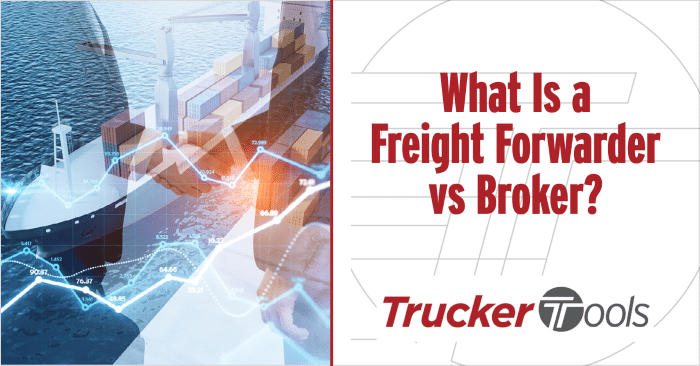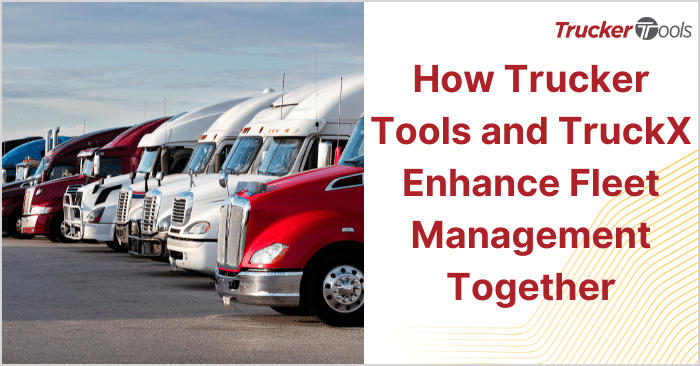In the transportation industry, you may hear the terms freight forwarder and freight broker used interchangeably. Both freight forwarders and freight brokers connect motor carriers and shippers. They both also negotiate freight rates and ultimately are responsible for tracking and managing deliveries. Though both roles involve moving shipments for shippers, forwarders and brokers do provide distinctly different services to companies that need to transport goods over the road. Read on to discover the differences between a freight forwarder vs broker and why these differences matter to shippers and carriers.
What Is a Freight Forwarder vs Broker?
What is a freight forwarder vs broker? According to the FMCSA, freight forwarders assume responsibility for transportation of shipments, may transport the freight itself, and are involved directly or indirectly with the cargo. In simple terms, the primary difference between a freight broker vs freight forwarder is that a freight forwarder takes possession of the shipment in addition to managing it. Forwarders assume legal responsibility for shipments, while carriers assume responsibility for shipments when a freight broker is involved.
A freight forwarder also often needs warehouse capacity to store shippers’ products, commercial trucks, staffing to load freight onto and off of trucks, and any supplies associated with shipping products. Forwarders handle international shipments, which isn’t typically in a freight broker’s wheelhouse. Since forwarders and brokers have different responsibilities within transportation, their licensing and insurance requirements differ, as well.
When To Use a Freight Forwarder vs Broker
If you’re a shipper, there are certain situations in which it makes sense to use a freight forwarder vs broker. If you need to move products internationally (particularly by sea or air), you’ll likely want to contract with a freight forwarder. When you’re moving small volumes of goods, high value cargo, and/or you have limited staffing and/or warehousing resources, using a freight forwarder also may be a good idea. If you’re a small start-up company with a lean infrastructure, you may want to use a freight forwarder to handle all aspects of shipping to keep your overhead low.
Shippers often use a freight broker vs freight forwarder when experiencing high demand or during peak shipping seasons. Companies that want to grow quickly and outsource aspects of their operations for greater efficiency and cost-savings may choose to work with freight brokers over freight forwarders.
Most carriers and drivers work with freight brokers, since freight forwarders are more likely to own and operate their own fleets and aren’t as likely to be searching for contract truckload capacity in the same way that freight brokers are. Freight brokers also tend to specialize in ground transportation rather than air or sea shipments, which is another reason why most carriers and owner operators work with freight brokers.
Freight Brokers and the Benefits of Using Them
As outlined above, freight brokers often specialize in shipping goods over the road domestically. While a broker can be authorized to transport shipments internationally, they often specialize in shipping to/from a specific region of the world or in a niche type of freight. Here are some of the benefits of using a freight broker vs freight forwarder:
○ Because brokers tend to specialize in domestic only or specific types of international shipping, they often possess deeper industry knowledge.
○ When markets are fluctuating, they can advise you on the latest freight rates and industry trends.
○ They are used to dealing with large freight volumes, which means they may be able to negotiate better rates with carriers.
○ They can optimize your shipment, ensuring it arrives safely and on time by using real-time technology to monitor routes and reduce inefficiencies.
○ When shipments are lost or damaged, a broker often will handle the claims process for you.
○ Brokers usually have ongoing business relationships with carriers since they specialize in ground transport. These existing relationships can translate into better service and access to real-time tracking data once the shipment is on the road.
Freight Forwarders and the Benefits of Using Them
Though there is some overlap between a freight forwarder vs broker, forwarders do provide distinctly different services. In addition to handling international shipments by air and sea, they can handle all aspects of your shipments, including packaging. Here are some of the benefits of using a freight forwarder vs broker.
○ Freight forwarders possess invaluable knowledge of international shipping and customs.
○ They also may have existing relationships and partnerships around the globe, which ultimately can benefit your business and bottom line.
○ They will prepare a bill of lading, invoice, certificate of origin and/or inspection certificate documentation on your behalf.
○ You don’t have to worry about properly packaging your products for shipment, as the forwarder will take that off your plate.
○ Freight forwarders will take care of properly labeling your freight. This is particularly important when you’re shipping internationally or via containers.
○ They also possess valuable knowledge of international compliance standards. Documentation errors may result in fines or additional expenses, which a freight forwarder can help you avoid.
Carriers and drivers, be sure to check out Trucker Tools’ load board.
Brokers, explore Trucker Tools’ digital freight matching platform.






